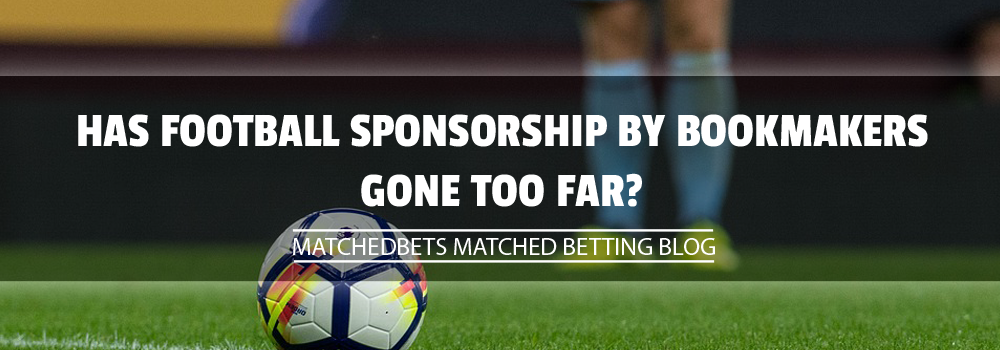Has Football Sponsorship By Bookmakers Gone Too Far?
January 29, 2020

There has been a lot of critical media coverage about the impact of gambling upon vulnerable members of society over the years, and there is a growing clamour for enhanced regulatory action and restrictions on the activities of betting companies. The most recent target for a crack-down is football sponsorship by bookmakers.
The Gambling Commission notes that the 2016 Health Survey indicates that there are about 340,00 problem gamblers in the UK with a further 1.7 million people who may become problem gamblers over time. Given that some 24 million people gambled in 2019 (almost half online), problem gamblers represent just 1.4% of the gambling population.
But the human cost of problem gambling is immense, with the impact rippling out from the problem gambler’s financial difficulties and mental health issues to family pressures to wider societal problems. How do you know if a person is a problem gambler? Quite simply, if a person has an urge to gamble continuously despite harmful negative consequences and contrary to a desire to stop, he or she may be a problem gambler. The term is defined by whether harm is experienced by the gambler or third parties, rather than by the gambler’s behaviour itself.
Bookmakers have accepted that they have a responsibility to limit the growth of problem gambling and that the betting industry should play a part in assisting problem gamblers to fight their addiction and move forward in a positive direction. To this end, they provide some £10million annually to support problem gamblers and encourage recovery. However, each betting company is also seeking to retain current customers and to gain new business. And this is where football sponsorship comes in.
For the 2019/20 football season, ten out of the twenty Premier League teams have sponsorship from gambling companies to a value of almost £350 million. It should be noted that none of the individual deals with bookmakers is as lucrative as, say, Manchester United’s $80 million annual sponsorship from US automobile company, Chevrolet, or the £45 million annual sponsorship by Etihad Airways for Manchester City. But still, £350 million is a whole lot of cash and, in return, the gambling companies’ logos are displayed prominently on players’ shirts, something that critics of the industry complain encourages youngsters to engage in problem gambling behaviours. And in the Championship the situation is even more pronounced with seventeen of the twenty four teams receiving sponsorship from gambling companies.
So has football sponsorship by betting sites gone too far? At the moment, there is no research to indicate that sponsorship on football shirts increases the incidence of problem gambling but common sense tells us that the link between a gambling company name and a football club will encourage fans to use that company to place their bets and may also normalise betting activity with youngsters. It also feels hypocritical that the prevalence of betting company logos on shirts is growing year-on-year at the same time as the Football Association is actively supporting the Heads Together campaign to improve mental health. And even some betting companies, notably Paddy Power through its “Save Our Shirt” campaign, are actively calling time on football sponsorship and urging competitors to keep football shirts clean of betting company logos.
Perhaps the final word on this matter should lie with recovering gambling addict James Grimes, who now seeks to raise awareness of the issues surrounding problem gambling. He says “Given gambling companies have accepted the principle of not showing TV ads during football matches because they are visible to children, it is completely unjustifiable for the pre-watershed ban to not extend to shirt sponsorship and pitch perimeter advertising as well”.
The government is expected to publish a report in Spring this year, part of which is expected to address the risk factors that encourage problem gambling. It will be interesting to see if football sponsorship by betting companies is identified as a risk factor by the researchers, and if recommendations are made to regulate the sponsorship. The Government recently banned the use of credit cards by gamblers, to limit the scope of problem gamblers to build up debts. Could more regulation now follow to limit sponsorship?
Comments